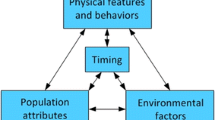Abstract
Some philosophers suggest that the development of scientificknowledge is a kind of Darwinian process. The process of discovery,however, is one problematic element of this analogy. I compare HerbertSimon's attempt to simulate scientific discovery in a computer programto recent connectionist models that were not designed for that purpose,but which provide useful cases to help evaluate this aspect of theanalogy. In contrast to the classic A.I. approach Simon used, ``neuralnetworks'' contain no explicit protocols, but are generic learningsystems built on the model of the interconnections of neurons in thebrain. I describe two cases that take the connectionist approach a stepfurther by using genetic algorithms, a form of evolutionary computationthat explicitly models Darwinian mechanisms. These cases show thatDarwinian mechanisms can make novel discoveries of complex, previouslyunknown patterns. With some caveats, they lend support to evolutionaryepistemology.
Similar content being viewed by others
REFERENCES
Campbell, D.T.: 1973, Ostensive Instances and Entitativity in Language Learning. In W. Gray and N.D. Rizzo (eds.), Unity Through Diversity, pt. 2. New York: Gordon and Breach.
Campbell, D.T.: 1974a, Evolutionary Epistemology. In P.A. Schilpp (ed.), The Philosophy of Karl Popper. LaSalle, Ill.: Open Court Publishing.
Campbell, D.T.: 1974b, Unjustified Variation and Selective Retention in Scientific Discovery. In F.J. Ayala and T. Dobshansky (eds.), Studies in the Philosophy of Biology. London: Macmillan.
Churchland, P.M.: 1996, The Engine of Reason, the Seat of the Soul: A Philosophical Journey into the Brain. Cambridge, MA: The MIT Press.
Cohen, L.J.: 1973, Is the Progress of Science Evolutionary? British Journal for the Philosophy of Science 24: 41–61.
Dennett, D.C.: 1995, Darwin's Dangerous Idea: Evolution and the Meanings of Life. New York: Simon & Schuster.
Hull, D.: 1982, The naked meme. In H.C. Plotkin (ed.), Learning, Development and Culture: Essays in Evolutionary Epistemology. New York: Wiley.
Hull, D.: 1990, Science as a Process. Chicago: University of Chicago Press.
Huxley, T.H.: 1893, The coming of age of The Origin of Species, in: Darwiniana: Collected Essays. London: Macmillan.
Langley, P., H.A. Simon, G.L. Bradshaw and J.M. Zytkow: 1987, Scientific Discovery: Computational Explorations of the Creative Processes. Cambridge: The MIT Press.
Moriarty, D.E. and R. Miikkulainen: 1995, Discovering Complex Othello Strategies through Evolutionary Neural Networks, Connection Science 7(3-4): 195–209.
Moriarty, D.E. and R. Miikkulainen: 1996, Evolving Obstacle Avoidance Behavior In A Robot Arm. In P. Maes, M. Mataric, J.A. Meyer and J. Pollack (eds.), From Animals to Animats: Proceedings of the Fourth International Conference on Simulation of Adaptive Behavior (SAB96, Cape Cod, MA). Cambridge, MA: MIT Press.
Popper, K.R.: 1959, The Logic of Scientific Discovery. NewYork: Harper & Row.
Popper, K.R.: 1968 (1962), Conjectures and Refutations: The Growth of Scientific Knowledge. New York: Harper and Row.
Popper, K.R.: 1972, Objective Knowledge: An Evolutionary Approach. Oxford: Oxford University Press.
Ruse, M.: 1985, Evolutionary Epistemology: Can Sociobiology Help? Synthese. Ruse, M.: 1986, Taking Darwin Seriously: A Naturalistic Approach to Philosophy. Oxford and New York: Basil Blackwell.
Thagard, P.: 1980. Against evolutionary epistemology. In P. Asquith and R. Giere (eds.), PSA 1980, East Lansing, MI: Philosophy of Science Association.
Author information
Authors and Affiliations
Rights and permissions
About this article
Cite this article
Pennock, R.T. Can Darwinian Mechanisms Make Novel Discoveries?: Learning from discoveries made by evolving neural networks. Foundations of Science 5, 225–238 (2000). https://doi.org/10.1023/A:1011356415685
Published:
Issue Date:
DOI: https://doi.org/10.1023/A:1011356415685




